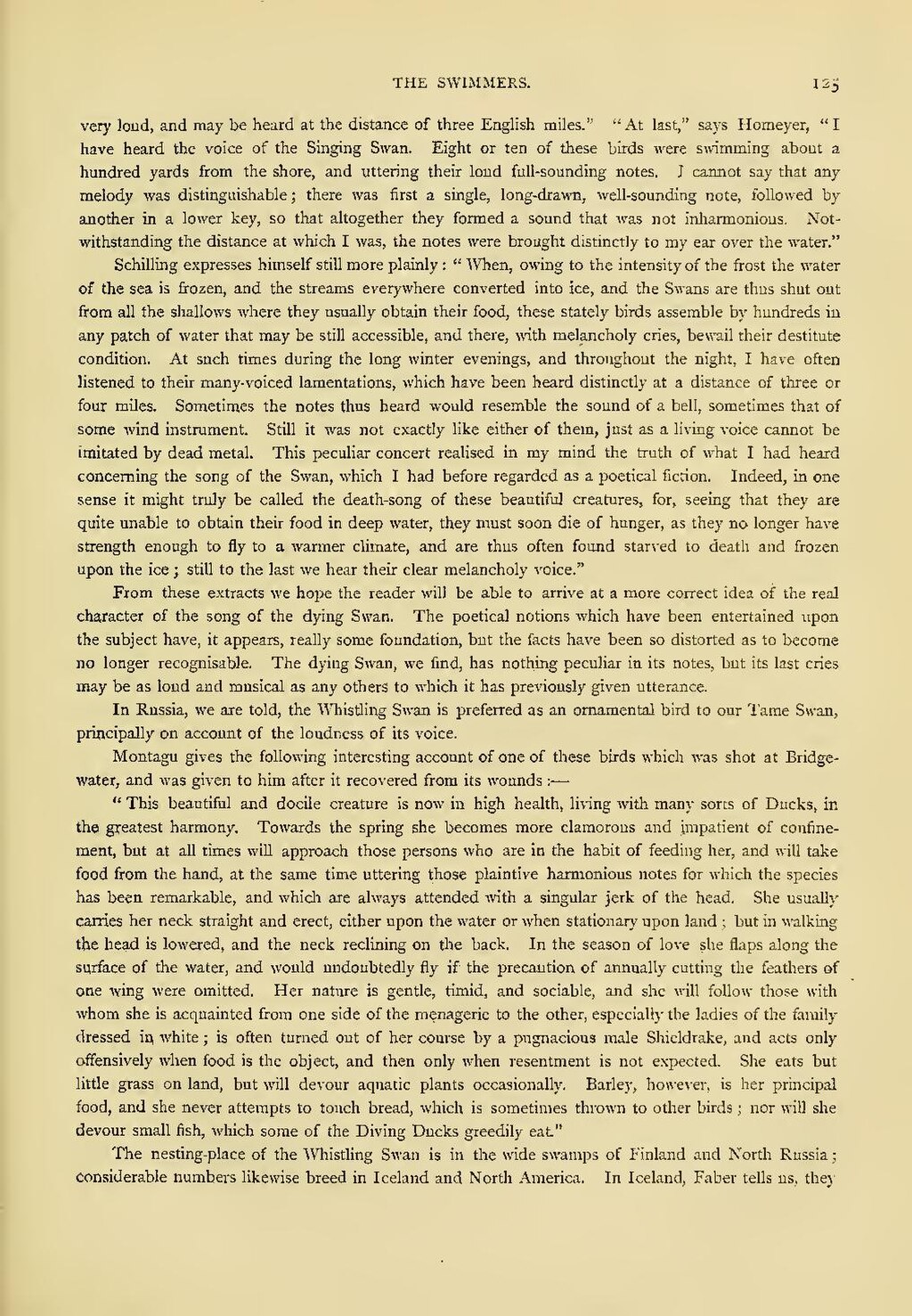very loud, and may be heard at the distance of three English miles." "At last," says Homeyer, "I have heard the voice of the Singing Swan. Eight or ten of these birds were swimming about a hundred yards from the shore, and uttering their loud full-sounding notes. I cannot say that any melody was distinguishable; there was first a single, long-drawn, well-sounding note, followed by another in a lower key, so that altogether they formed a sound that was not inharmonious. Notwithstanding the distance at which I was, the notes were brought distinctly to my ear over the water."
Schilling expresses himself still more plainly: "When, owing to the intensity of the frost the water of the sea is frozen, and the streams everywhere converted into ice, and the Swans are thus shut out from all the shallows where they usually obtain their food, these stately birds assemble by hundreds in any patch of water that may be still accessible, and there, with melancholy cries, bewail their destitute condition. At such times during the long winter evenings, and throughout the night, I have often listened to their many-voiced lamentations, which have been heard distinctly at a distance of three or four miles. Sometimes the notes thus heard would resemble the sound of a bell, sometimes that of some wind instrument. Still it was not exactly like either of them, just as a living voice cannot be imitated by dead metal. This peculiar concert realised in my mind the truth of what I had heard concerning the song of the Swan, which I had before regarded as a poetical fiction. Indeed, in one sense it might truly be called the death-song of these beautiful creatures, for, seeing that they are quite unable to obtain their food in deep water, they must soon die of hunger, as they no longer have strength enough to fly to a warmer climate, and are thus often found starved to death and frozen upon the ice; still to the last we hear their clear melancholy voice."
From these extracts we hope the reader will be able to arrive at a more correct idea of the real character of the song of the dying Swan. The poetical notions which have been entertained upon the subject have, it appears, really some foundation, but the facts have been so distorted as to become no longer recognisable. The dying Swan, we find, has nothing peculiar in its notes, but its last cries may be as loud and musical as any others to which it has previously given utterance.
In Russia, we are told, the Whistling Swan is preferred as an ornamental bird to our Tame Swan, principally on account of the loudness of its voice.
Montagu gives the following interesting account of one of these birds which was shot at Bridgewater, and was given to him after it recovered from its wounds:—
"This beautiful and docile creature is now in high health, living with many sorts of Ducks, in the greatest harmony. Towards the spring she becomes more clamorous and impatient of confinement, but at all times will approach those persons who are in the habit of feeding her, and will take food from the hand, at the same time uttering those plaintive harmonious notes for which the species has been remarkable, and which are always attended with a singular jerk of the head. She usually carries her neck straight and erect, either upon the water or when stationary upon land; but in walking the head is lowered, and the neck reclining on the back. In the season of love she flaps along the surface of the water, and would undoubtedly fly if the precaution of annually cutting the feathers of one wing were omitted. Her nature is gentle, timid, and sociable, and she will follow those with whom she is acquainted from one side of the menagerie to the other, especially the ladies of the family dressed in white; is often turned out of her course by a pugnacious male Shieldrake, and acts only offensively when food is the object, and then only when resentment is not expected. She eats but little grass on land, but will devour aquatic plants occasionally. Barley, however, is her principal food, and she never attempts to touch bread, which is sometimes thrown to other birds; nor will she devour small fish, which some of the Diving Ducks greedily eat."
The nesting-place of the Whistling Swan is in the wide swamps of Finland and North Russia; considerable numbers likewise breed in Iceland and North America. In Iceland, Faber tells us, they
